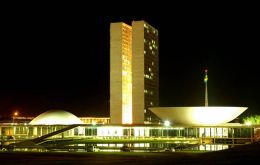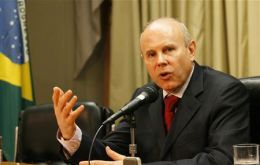MercoPress. South Atlantic News Agency
Politics
-
Thursday, September 20th 2012 - 06:09 UTC
Argentine campaign to promote domestic tourism disqualifying Mercosur options

Argentina launched an aggressive campaign to boost domestic tourism this coming summer season by publishing hotel, food and rent prices of resorts along the Atlantic coast and comparing them with similar options in Mercosur partners such a Uruguay, Brazil and Chile.
-
Thursday, September 20th 2012 - 06:00 UTC
Chile and Peru, countries with the highest economic freedom score in Latam

Latin America shows a huge diversity regarding economic freedom with Chile (10) and Peru (24) among the top ranked 25 countries and another four, Bolivia, Ecuador, Argentina and Venezuela at the other end according to the latest report on Global Economic Freedom.
-
Thursday, September 20th 2012 - 05:55 UTC
Venezuela’s Capriles with a fair chance of winning the “mother of all political battles”

With less than three weeks for the “mother of all political battles” in Venezuela but that will have repercussions in the rest of the continent, the latest public opinion polls are indicating that opposition candidate Henrique Capriles is leading with 52% vote intention while Hugo Chavez has 48%.
-
Thursday, September 20th 2012 - 05:06 UTC
Family farmers and greens converge on Brussels to protest EU agriculture policy

Farmers and activists from all over the continent converged on European Union headquarters Wednesday to push for a food policy that is fairer to family farmers and kinder to the environment and developing nations.
-
Thursday, September 20th 2012 - 02:22 UTC
Uruguayan president Mujica at his lowest approval rate since taking office

The approval of Uruguayan president Jose Mujica dropped to 36% which is the lowest since he took office in March 2010, and the lowest of the ruling coalition Broad Front, according to the latest public opinion release.
-
Thursday, September 20th 2012 - 01:40 UTC
Brazil announces auctioning of new oil concessions for next May

Brazil's Dilma Roussef has approved the auctioning of new oil concessions next year, subject to congressional approval of a new royalties law, authorities said. The 11th auction outside the pre-salt next May would involve 74 oil blocks, half at sea and half on land.
-
Wednesday, September 19th 2012 - 21:15 UTC
Don’t wait for the end of the EU crisis: boost trade among emerging economies, recommends Brazil

Brazilian finance minister Guido Mantega said that resolving Europe’s economic problems are likely to drag out over coming years due to a complex and slow process of decision-making in the region and recommended emerging economies to promote domestic consumption and trade among them.
-
Wednesday, September 19th 2012 - 21:07 UTC
Spain has not invited Paraguay to the Ibero-American summit confirms Asunción

Spain has not invited Paraguay to the Ibero-American summit in Cadiz scheduled for next November confirmed Paraguayan Foreign minister Jose Felix Fernandez Estigarribia, who also admitted that the number of countries ‘disgusted’ with the new administration of President Federico Franco has diminished considerably.
-
Wednesday, September 19th 2012 - 06:22 UTC
Argentina Paypal-users activities limited to international payments

Paypal is to prevent users in Argentina from transferring money between their own accounts. The online payment service said that from 9 October: “Argentina resident Paypal-users may only send and receive international payments.”
-
Wednesday, September 19th 2012 - 06:10 UTC
Leading political figure of Spain’s contemporary history dies

Veteran Communist leader Santiago Carrillo, Spain's last surviving public figure to have taken an active part in the civil war and the reinstatement of democracy has died at age 97, sources close to the family said.
